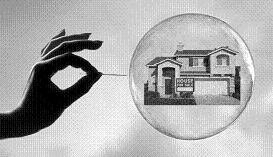Grantham: Biggest Housing Bubble Since 807 A.D. Has Burst

Or Maybe the Biggest of All Time …
Preface: Many claim that housing is currently experiencing a rebound. Whether or not that ends up being verified, the housing crash which started in 2007 was so massive that it is historic in its significance.
Top economists and economic agencies have recently verified that bubbles cause huge crashes, and are thus bad for the economy. See this, this and this.
We’ve previously noted that the housing bubble which burst in 2007 was bigger than the Great Depression … and perhaps bigger than any housing bubble in 700 years:
The question is, given the boom we had between 2001-2007, how bad a bust might we have?
Well, in the greatest financial crash of all time – the crash of the 1340s in Italy, which brought on a new dark Age – real estate prices fell by 50 percent by 1349 in Florence when boom became bust.
How does that compare to 2001-2007? The price of Southern California homes is already down 41%, Southern California hasn’t fallen as fast as some other areas, and we’re nowhere near the bottom of the market.
Moreover, the bubble was not confined to the U.S. There was a worldwide bubble in real estate.
***
Housing bubbles are now bursting in China, France, Spain, Ireland, the United Kingdom,Eastern Europe, and many other regions.
And the bubble in commercial real estate is also bursting world-wide. See this.
Jeremy Grantham just said that our recent bubble was the largest in 1,200 years:
Investors should be wary of a Fed [who] is led by a guy [Bernanke] who couldn’t see a 1-in-1200-year housing bubble!
2007 – when the housing bubble popped – minus 1,200 years brings us to 807 A.D.
To give a sense of how long ago that was, Charlemagne had just defeated the Saxons – one of the tribes forming the famed Anglo-Saxons – and forcibly converted them to Christianity. England didn’t become a country until hundreds of years later, during the Norman Conquest of 1066 .
But the housing bubble which burst in 2007 was arguably the largest in history … ever.
As we’ve noted:
In “What Goes Up”, I discussed the law of booms and busts. A big boom with easy credit leads to a big bust.
***
The Economist magazine wrote in 2005 that the worldwide boom in residential real estate prices in this decade was “the biggest bubble in history“. The Economist noted that – at that time – the total value of residential property in developed countries rose by more than $30 trillion, to $70 trillion, over the past five years – an increase equal to the combined GDPs of those nations.
***
The bigger the boom, the bigger the bust. Because we have likely just lived through the greatest boom in history, we may see the biggest bust in history. (No wonder the guys who predicted this crisis are gloomy about the future. Is this why the big players are selling everything that’s not nailed down to raise cash?)
If true, this is saying something dramatic. Because the bubble in 1340 Italy was so big that its bust helped precipitate a new dark age.
Too bad that the government helped to blow the bubble, and hasn’t done anything meaningful to help homeowners.
We also noted something that is now obvious to all:
The real estate bubble formed the base upon which a series of bubbles in derivatives were built. Specifically, mortgages were packaged in “collateralized debt obligations” (CDOs), which were sold in enormous volumes all over the world. Credit default swaps were then bet against the companies which bought and sold the CDOs.
Now, with housing prices crashing, the CDO bubble is crashing, as is the CDS bubble.
A series of other derivatives bubbles are also crashing. For example, the “collateralized fund obligations” – sort of like CDOs, but where the assets of a hedge fund are the asset being bet on – are getting creamed as hedge funds are forced to sell off many hundreds of billions in assets to cover margin calls.
As everyone knows, the size of the global derivatives bubble was almost 10 times the size of the world economy [Update: It was actually 20 times the world economy]. And many areas of derivatives are still hidden and murky.
So the bust of the derivatives bubble could even be bigger than the bust of the housing bubble.
Too bad the government helped to blow the derivatives bubble, and isn’t doing anything to rein in derivatives now. See this, this, this and this.

